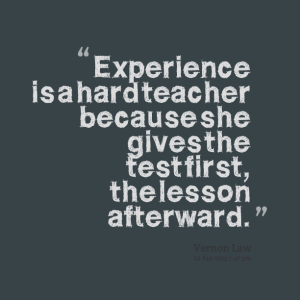“No philosophy, theory or model can possibly capture or explain every single aspect of the idiosyncratic reality that is your own experience as a teacher” (Brookfield, 2006, p.265).
credit: inspirably.com
Objective: The context for Brookfield was in regard to standardized models and approaches for effective teaching. He attempts to bring awareness to the fact that there is no correct formula for educational enlightenment due to the fact that teaching is highly situational and educator responses are based on their prior learning experiences. The educator is thus a lifelong learner, particularly adept in experiential learning and continually seeking professional development.
Reflective: The motive for choosing this quote is due to the fact that I am intrigued by the prospect of efficacy in teaching, ensuring that it follows the best practices of educational literature. The reality, as portrayed by Brookfield, is that there is no absolute correct theory and there will be numerous factors affecting the approaches I select. Each course will be comprised of diverse individuals that can teach me valuable lessons and direct my instructional decisions.
Interpretive: The insights obtained from this quote are in regard to the notion of progress and not perfection. It brings into perspective the ultimate goal of teaching, the product of learning, and how that can unfold in reality. There may be instances where philosophies, theories and strategic lesson plans may capture effective teaching and other times where an inexplicable gut feeling may be the contextually proper solution. The transformative learning as a result of this quote is that teaching is complex, and unlike math, there is no absolute right or wrong answer. This can be intimidating to someone who is familiar with Science, such as myself, however, I have recently learned to value the benefits of the unknown and experience every learning opportunity with a positive, growth mindset mentality (Smilkstein, 2011). The four stages of Kolb’s experiential learning cycle are: concrete experience (CE), Reflective observation (RO), abstract conceptualization (AC) and active experimentation (AC) (Merriam & Bierema, 2014). This has significant implications for experienced educators as they can continually progress through the cycle throughout their careers and thus have valuable experience based educational insights, which they can model and further use to mentor younger educators.
Decisional: One important aspect as a result of this quote, is the notion of a private teaching journal. This journal would be a compilation of my teaching successes as well as perhaps challenging endeavors. I believe it would be a wonderful resource for reflection, on my personal and professional growth as well as a document to revisit in times of momentous paradigm shifts within education. As my vision, philosophies and values change with increased knowledge and experience, I can continually re-evaluate scenarios and devise alternate means of action. As Lindeman points out “the resource of highest value in adult education is the learner’s experience” (1961, p.6), which is precisely how I view the adult educator, as a lifelong learner committed to being a reflective practitioner with the goal of advancing the scholarship of teaching and learning.
